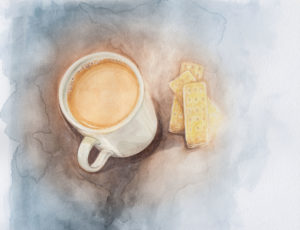Memory Bites
by Dr Loshini Moodley
June 05, 2017

In my migration to the south, I stopped at an island in the Indian Ocean nestled in the tropical curve of Africa where nostalgia seeped and memory flowed through the senses.
The past was not only another country but another life. Life there, followed the irresistible rhythms of the tidal lagoon under the smother of humidity where surrender was the only option.
A surrender to the the bright white strobe of the moon flashing paths through the exposed white sandbar; to the weightless of the salty tepid amniotic sea- a regression to pre-birth; to the prickle tickle of shoals of baby medusa stings: to the fecund sea salt rot mingled with fermenting milk sweat and evening wood smoke smell; to the lipid lassitude of heat, to the embrace of blue in the sky and green in the sea and to taste….
It was a place where I was told mangoes were always in season, the roads were lined with glossy leafed mango trees and the fruit hung enticingly.
As a child I would watch, waiting for the moment of perfect ripeness to pick them before they splatted to the ground or were snatched and gobbled by the local monkeys.
And I reverted to being a mango eating fruit bat, shedding the conventions of western table manners with gluttonous delight, biting into and sucking on fleshy sharp sweet pulp and sucking on stringy seeds with a swim to wash off sticky face and sticky fingers festooned with mango floss…a gleeful messiness.
These mangoes were nothing like the etiolated versions in western supermarkets engineered and sanitised for convenience, for less messiness.
Messiness is much maligned. So a mango smuggler, I became, spiriting some across the border for my family who would be appreciative of the delights of a mango out of season.
I am now visiting my extended family embraced by their affection and the rhythms of food, feeding, and being fed. Our lives have shifted and the familiarity is historic, remembered and refreshed by our rituals. I am basted in the familiar, heavily laden with ‘F’ words of family, of feelings, and of food, which feeds a familial connection.
The garden holds papaya trees, avocados hanging glossily, mango trees sadly bereft of mangoes, a chili plantation, and vegetables of which I only know the Tamil or Telugu names from which I am fed.
It holds the taste and fragrance of childhood, my grandmother’s cooking and her gardening philosophy which was driven by pragmatism as there is no point in planting anything that does not feed you.
There is, however, an unacknowledged sentimentality to this planting. In its action, content, and scope it established a connection with the traditions and lands of her ancestors and is rooted memory and identity. It has the flavour of an unexpressed, perhaps unconscious yearning for that which is past.
The air is heavy with water, viscous with the smell of fecundity. It is more than an end of summer rainstorm in its persistence and feels like the edge of a cyclone in its violence with the rain—sharp spikes flaying the skin.
I can hear the smash crash of the sea, a reliable roar in the distance. The sky is a padded cell, shutting out the usually blue sky and creating a tepid gray half light.
There is a lush endless exuberant green with a prominence of flat, glossy-leafed plants with spires of red warty tongue-like flowers, and the remains of the fruit trees planted by the former inhabitants displaced by apartheid’s social engineering.
These scars have been greened over, now, and the luxuriant growth hides the messiness of pain and absorbs the shame. The ravening hordes of monkeys are its new inhabitants.
The graves of my grandfathers, landscape of my parents’ childhoods have disappeared under the new developments in the land, grasped of greed, the only two temples evocative of childhood terrors, now benign and soothing, remain.
The edges of memory are blurring and my identity is un-anchoring, with tendrils grasping for support and I look towards the physical city.
The physical city is familiar, yet unfamiliar, and I am a familiar stranger. I hold its past, not its present. The streets essentially weave the same paths of my childhood but now have different names, following the orgy of post apartheid renaming.
It is an assertion of identity and ego. It attempts to obliterate the past and to create new icons. It is a resetting of consciousness. It is history rewritten in the concreteness and the maps of the city.
I am however lost, disorientated as my maps—my nominal memory maps, negotiating the world through names—are no longer valid.
The landscape, physical and familial, holds my memory, archaeological artefacts that afford glimpses of who I used to be, and I can bear the distance of the palimpsestic gaze.
I hold onto the flavor, the memory of what it had been, but no longer its essence. The messiness, the fluff and stuff have been eroded by time and change. It is through the senses I can both reconnect and refresh…and form new memories.





























